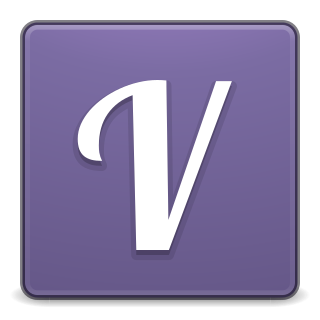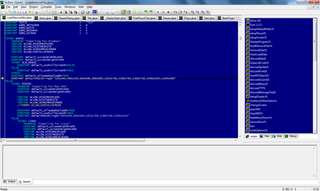Related Research Articles

Blitz BASIC is the programming language dialect of the first Blitz compilers, devised by New Zealand-based developer Mark Sibly. Being derived from BASIC, Blitz syntax was designed to be easy to pick up for beginners first learning to program. The languages are game-programming oriented but are often found general-purpose enough to be used for most types of application. The Blitz language evolved as new products were released, with recent incarnations offering support for more advanced programming techniques such as object-orientation and multithreading. This led to the languages losing their BASIC moniker in later years.
Rebol is a cross-platform data exchange language and a multi-paradigm dynamic programming language designed by Carl Sassenrath for network communications and distributed computing. It introduces the concept of dialecting: small, optimized, domain-specific languages for code and data, which is also the most notable property of the language according to its designer Carl Sassenrath:
Although it can be used for programming, writing functions, and performing processes, its greatest strength is the ability to easily create domain-specific languages or dialects

Palm OS is a discontinued mobile operating system initially developed by Palm, Inc., for personal digital assistants (PDAs) in 1996. Palm OS was designed for ease of use with a touchscreen-based graphical user interface. It is provided with a suite of basic applications for personal information management. Later versions of the OS have been extended to support smartphones. Several other licensees have manufactured devices powered by Palm OS.
Curl is a reflective object-oriented programming language for interactive web applications whose goal is to provide a smoother transition between formatting and programming. It makes it possible to embed complex objects in simple documents without needing to switch between programming languages or development platforms. The Curl implementation initially consisted of just an interpreter, but a compiler was added later.

Lua is a lightweight, high-level, multi-paradigm programming language designed primarily for embedded use in applications. Lua is cross-platform, since the interpreter of compiled bytecode is written in ANSI C, and Lua has a relatively simple C API to embed it into applications.

Liberty BASIC (LB) is a commercial computer programming language and integrated development environment (IDE). It has an interpreter, developed in Smalltalk, which recognizes its own dialect of the BASIC programming language. It runs on 16- and 32-bit Windows and OS/2.

Microsoft QuickBASIC is an Integrated Development Environment and compiler for the BASIC programming language that was developed by Microsoft. QuickBASIC runs mainly on DOS, though there was also a short-lived version for the classic Mac OS. It is loosely based on GW-BASIC but adds user-defined types, improved programming structures, better graphics and disk support and a compiler in addition to the interpreter. Microsoft marketed QuickBASIC as the introductory level for their BASIC Professional Development System. Microsoft marketed two other similar IDEs for C and Pascal, viz QuickC and QuickPascal.

Visual Basic, originally called Visual Basic .NET (VB.NET), is a multi-paradigm, object-oriented programming language, implemented on .NET, Mono, and the .NET Framework. Microsoft launched VB.NET in 2002 as the successor to its original Visual Basic language, the last version of which was Visual Basic 6.0. Although the ".NET" portion of the name was dropped in 2005, this article uses "Visual Basic [.NET]" to refer to all Visual Basic languages released since 2002, in order to distinguish between them and the classic Visual Basic. Along with C# and F#, it is one of the three main languages targeting the .NET ecosystem. As of March 11, 2020, Microsoft announced that evolution of the VB.NET language has concluded.
Object Pascal is an extension to the programming language Pascal that provides object-oriented programming (OOP) features such as classes and methods.
TI-BASIC is the official name of a BASIC-like language built into Texas Instruments (TI)'s graphing calculators. TI-BASIC is a language family of three different and incompatible versions, released on different products:
thinBasic is a BASIC-like computer programming language interpreter with a central core engine architecture surrounded by many specialized modules. Although originally designed mainly for computer automation, thanks to its modular structure it can be used for wide range of tasks.

Vala is an object-oriented programming language with a self-hosting compiler that generates C code and uses the GObject system.
XBLite is a free Open Source BASIC programming language compiler and development system. It was started in 2001 by David Szafranski in order to provide a Windows exclusive version of the XBasic dialect. XBLite is released under the GNU GPL licensing scheme, Standard libraries are released under the GNU LGPL licensing scheme.

GLBasic is a commercial BASIC programming language that can compile to various platforms including Windows, Linux, Mac OS X, and some handheld devices. The language is designed to be simple and intuitive.
A scripting language or script language is a programming language for a runtime system that automates the execution of tasks that would otherwise be performed individually by a human operator. Scripting languages are usually interpreted at runtime rather than compiled.

Ultimate++, also known as Ultimatepp, U++ or Upp - is a C++ rapid application development framework which aims to reduce the code complexity of typical desktop applications by extensively exploiting C++ features. Programs created with it can work on multiple operating systems and hardware architectures without the need to write platform specific code.

Hollywood is a commercially distributed programming language developed by Andreas Falkenhahn which mainly focuses on the creation of multimedia-oriented applications. Hollywood is available for AmigaOS, MorphOS, WarpOS, AROS, Windows, macOS, Linux, Android, and iOS. Hollywood has an inbuilt cross compiler that can automatically save executables for all platforms supported by the software. The generated executables are completely stand-alone and do not have any external dependencies, so they can also be started from a USB flash drive. An optional add-on also allows users to compile projects into APK files.
Nemerle is a general-purpose, high-level, statically typed programming language designed for platforms using the Common Language Infrastructure (.NET/Mono). It offers functional, object-oriented, aspect-oriented, reflective and imperative features. It has a simple C#-like syntax and a powerful metaprogramming system.

ColdBox is a free, open-source, conventions-based, modular web application framework intended for building enterprise applications with ColdFusion (CFML) using a Hierarchical MVC approach.

Ring is a dynamically typed, general-purpose programming language. It can be embedded in C/C++ projects, extended using C/C++ code and/or used as a standalone language. The supported programming paradigms are imperative, procedural, object-oriented, functional, meta, declarative using nested structures, and natural programming. The language is portable and can be used to create console, GUI, web, game and mobile applications.